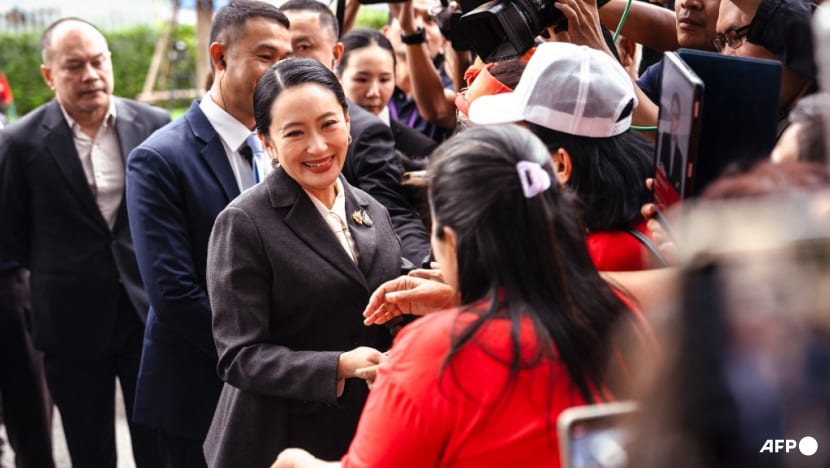Commentary: Thailand’s old guard calls the shots as yet another prime minister sacked
Real power remains firmly in the hands of Thailand’s traditional conservative elites, says former foreign correspondent Nirmal Ghosh.

Thailand's sacked prime minister Paetongtarn Shinawatra greets supporters as she arrives at the Pheu Thai Party headquarters after her dismissal by the Constitutional Court in Bangkok on Aug 29, 2025. (Photo: AFP/Chanakarn Laosarakham)

This audio is generated by an AI tool.
SINGAPORE: It was deja vu Friday (Aug 29) in Thailand when the country’s powerful nine-member Constitutional Court sacked Prime Minister Paetongtarn Shinawatra over what it ruled was an ethics violation.
Ms Paetongtarn, 39, daughter of former prime minister Thaksin Shinawatra, the telecom tycoon who won power in a landslide in 2001 and was thrown out by the army in 2006, had earlier been suspended pending the court’s judgment on the case, which centered on an imprudent phone call she had with Cambodia’s strongman Hun Sen.
The bottom line, say analysts, is that power remains in the hands of Thailand’s royalist political elites, with the judiciary – in particular the Constitutional Court – and the army acting as firewalls against any serious attempt at fundamental structural change.
Ms Paetongtarn became the sixth prime minister from either the Shinawatra family or their Pheu Thai Party, to be removed either by the army or by the judiciary since the 2006 coup d’etat.
Her downfall itself may not overly perturb the Thai public; her popularity, never very high, had plunged in recent months anyway, and the Shinawatra star has been on the wane.
EXCESSIVE POWER
In the last election in 2023, the Pheu Thai Party had come in second after the progressive Move Forward Party – itself the second iteration of the Future Forward Party, founded in 2018 and dissolved by the Constitutional Court in 2020.
The Move Forward party was in turn dissolved by the Constitutional Court in August 2024 on grounds that its proposition to amend Article 112 – the country’s lese majeste law – violated the country’s constitution.
Ms Paetongtarn’s downfall – regardless of the reasons for it - has many commentators warning yet again of excessive power vested in the nine appointed judges of the Constitutional Court – as well as the inherent tension within Thailand’s power structure which has seen frequent military and judicial interventions, and changes of prime ministers.
This has in recent years in particular created political uncertainty and policy drift, distracting from economic growth. Recipes for revival floated by the Pheu Thai Party – including a land bridge across the Kra Isthmus in southern Thailand, and legalisation and promotion of casinos to beef up the country’s menu of tourist attractions - have thus far come to nothing and are unlikely to progress as long as the current uncertainty continues.
The dismissal of Ms Paetongtarn underscores the considerable power of independent organisations that have operated above the normal political system, says Pavin Chachavalpongpun, Professor of Southeast Asian Studies at Kyoto University.
“Such developments have time and again eroded public trust in Thailand's political system as a whole”, Professor Pavin told me.
HUN SEN FACTOR
Rubbing salt into the wound is the fact that former Cambodian Prime Minister Hun Sen has shown - with the leak of the conversation with Ms Paetongtarn in which she appeared to be subservient - that he can destabilise Thai politics.
Ms Paetongtarn’s father and Hun Sen had up till then been close friends. At Hun Sen’s 71st birthday celebration in August 2023, he referred to Thaksin as his “godbrother”.
“It’s a disaster, this is basically a foreign country dictating what happens in Thai politics,” a Pheu Thai insider told me.
“You can’t change prime ministers like you change your clothes. Thailand needs a stable government to negotiate and do deals with other countries, but the bureaucracy has been in neutral gear since Paetongtarn’s suspension in July despite politicians pushing for things to happen,” he added.
Till date nobody appears to know for certain what lies at the bottom of the falling out between Thaksin and Hun Sen, though two sources told me that Thailand’s pressure – itself under pressure from China - on Cambodia-based scam centres has been a factor.
Whatever the reason, Ms Paetongtarn’s seemingly politically naive phone call with “uncle” Hun Sen triggered nationalist protests against her in Bangkok and precipitated a border clash between Thailand and Cambodia that killed at least 40 and brought cross-border trade to an abrupt and acrimonious halt.
The conflict reverberated, even drawing United States President Donald Trump into pressuring both parties to a ceasefire. This in turn kicked off a hurried face-saving off-ramp for ASEAN in the form of a meeting in Malaysia chaired by Malaysian Prime Minister and current ASEAN chair Anwar Ibrahim, where Thailand and Cambodia agreed to a ceasefire.
The tension is far from over; the ceasefire holds but only tenuously. A new prime minister in Thailand would have his or her hands full managing the sensitive relationship with Cambodia, while pressured to appease nationalists in Thailand, where the powerful army has had a chance to wave its own nationalist credentials.
ELECTION IN THE OFFING
Late on Friday night another party, Bhumjaithai, which quit the ruling coalition in June, said it was in talks with allies to form a new coalition government, with its leader Anutin Charnvirakul as the next prime minister.
“Previous governments could not resolve the problems, but we are confident that we can. We care about the country and want to restore peace and stability,” Mr Anutin said.
He also pledged to return power to the people through another general election which could be held in four months.
But few expect another election to break what has become an inexorable cycle and resolve the inherent fragility of the country's parliamentary democracy. The writing on the wall is that real power remains firmly in the hands of Thailand’s traditional conservative elites.
Nirmal Ghosh, a former foreign correspondent, is an author and independent writer based in Singapore.


















